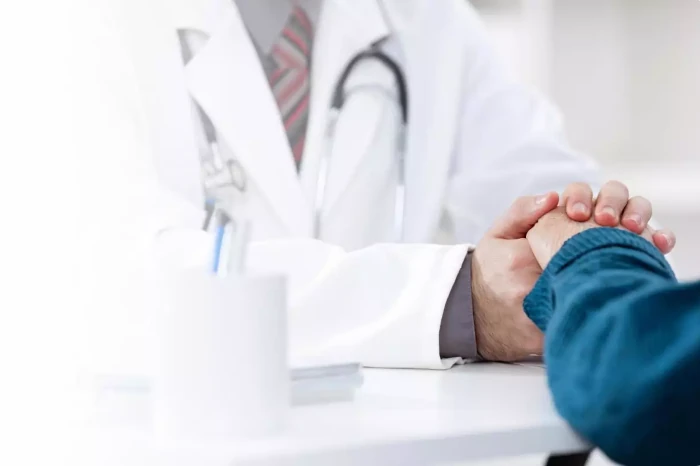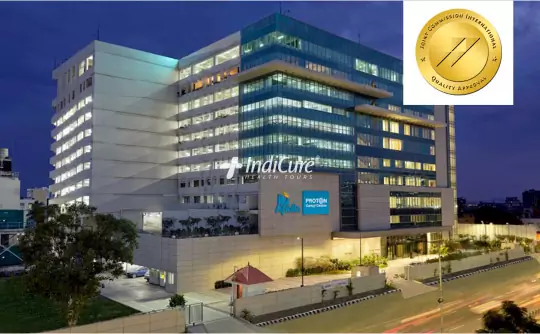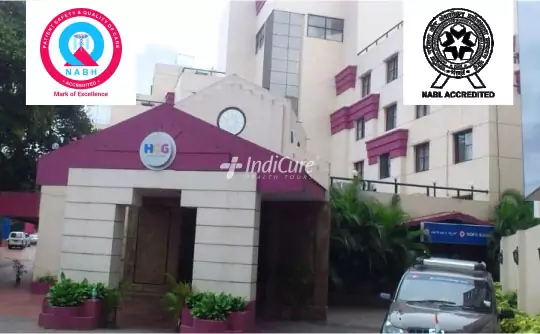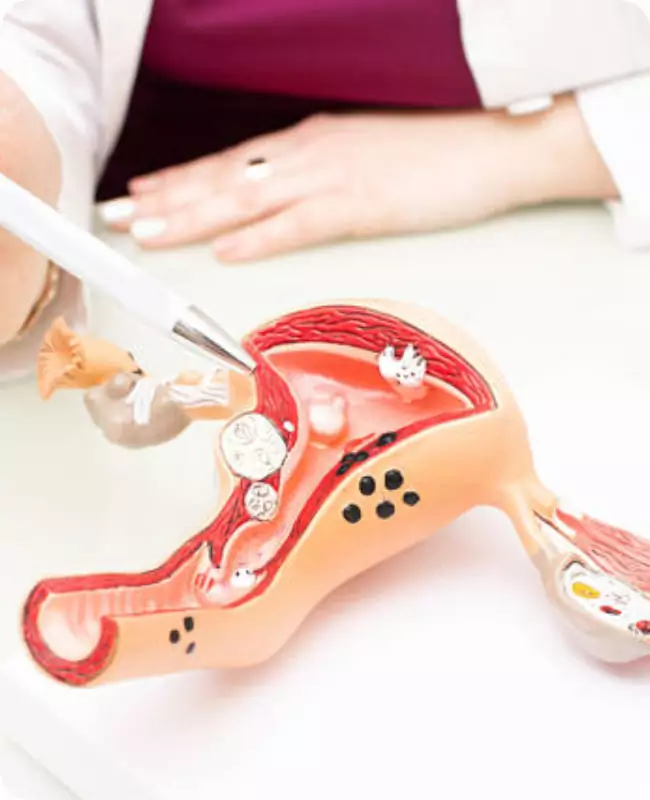

Bladder Cancer Treatment Cost in India depends on the type of treatment required, your medical condition, facility and the city where you choose to get the treatment done. You may need either surgery or chemotherapy, or may need both; or a combination of chemotherapy, radiotherapy and surgery. The cost would thus change accordingly.
Typical costs for Bladder Cancer Treatment in India looks like:
| Procedure | Cost (Range in US $) |
|---|---|
| Investigations | 500-1000 |
| Chemotherapy | 300-2,000 per cycle |
| Radiotherapy | 3500-5500 |
| Cystectomy | 3000-5000 |
| TURBT | 4000-6000 |
An important expense when it comes to your bladder cancer treatment in India is going to be your oncologist's fees. IndiCure recommends highly experienced, skilled, board-certified surgeons who are capable of delivering successful surgeries. Although the charges may vary depending on the experience of the surgeon, you can be assured that you are in safe and skilled hands when you choose cancer treatment in India with IndiCure.
Many times, the best option might include more than one type of treatment. Surgery, alone or with other treatments, is used to treat most bladder cancers. The cost associated with each type of treatment is different. IndiCure recommends you to understand the options by consulting our expert oncologists.
The overall bladder cancer treatment cost depends on the number of chemotherapy or radiation therapy cycles that a patient has to undergo. In some patients, the doctors might advise giving more than a couple of cycles of chemotherapy or radiation therapy to kill the cancerous cells.
Having your treatment for bladder cancer in an accredited surgical facility by skilled and qualified medical staff is a critical factor. Moreover, the geographical location of this facility in India also affects the quote. But, IndiCure provides you with a projected estimate that will be all inclusive and affordable.
The pre-surgical/treatment expenses are associated with the stage of the cancer and medical condition of the patient and thus the number and type of investigations and treatment required. Post-treatment expenses may include prescription medications and follow-up consultations.
We at IndiCure, understand that you travel with a budget in mind and do not like to be greeted by surprises after arrival in India. We thus club all these expenses and give you the package cost that is inclusive and affordable at the same time.
Your case manager shall give you an estimated cost of your surgery after discussing your medical reports with the surgeon. The final cost, however, shall be confirmed after your consultation with the surgeon.
In fact, we have Special Negotiated Rates with the Hospitals and you can avail Discounted Rates when you choose to Travel with IndiCure.


We Help you Choose the Right Treatment, Surgeon & Hospital

We Arrange Video/Telephonic Consultation with the Surgeon

We Assist you with Visa & Accommodation

We Receive you at the Airport and Drop you at Hotel/Hospital

We Assist you the at Hospital & Provide Post Operative Support

Chennai
The Apollo Proton Cancer Centre (APCC) is South Asia's and the Middle East's first and only proton therapy centre, as well as India's first JCI-accredited cancer hospital. The APCC includes a completely integrated treatment suite that provides the most advanced surgical, radiation, and medical procedures available. The Centre brings together a remarkable team of clinicians renowned globally in cancer care, in keeping with the Apollo Pillars of Expertise and Excellence.

Bangalore
HCG- HealthCare Global Enterprises Ltd, is the specialized chain of hospitals in cancer care headquartered in Bangalore. Founded by Dr. Ajaikumar, a renowned medical and radiation oncologist with 40 years of experience, HCG has 26 centres across India with its largest facility in Bangalore.
HCG Hospital Bangalore is not only the most advanced facility for cancer care in India, it is a Centre of Excellence for most advanced cancer care and research.
Bladder cancer starts when cells that make up the urinary bladder start to grow out of control. As more cancer cells develop, they can form a tumor and, with time, spread to other parts of the body.
The bladder is a hollow organ in the lower pelvis. It has flexible, muscular walls that can stretch to hold urine and squeeze to send it out of the body. The bladder's main job is to store urine. Urine is liquid waste made by the 2 kidneys and then carried to the bladder through 2 tubes called ureters. When you urinate, the muscles in the bladder contract, and urine is forced out of the bladder through a tube called the urethra.
Urothelial carcinoma (transitional cell carcinoma): Urothelial carcinoma, also known as transitional cell carcinoma (TCC), is by far the most common type of bladder cancer. These cancers start in the urothelial cells that line the inside of the bladder.
Squamous cell carcinoma: Only about 1% to 2% of bladder cancers are squamous cell carcinomas. Seen with a microscope, the cells look much like the flat cells that are found on the surface of the skin. Nearly all squamous cell carcinomas of the bladder are invasive.
Adenocarcinoma: Only about 1% of bladder cancers are adenocarcinomas. These cancer cells have a lot in common with gland-forming cells of colon cancers . Nearly all adenocarcinomas of the bladder are invasive.
Small cell carcinoma: Less than 1% of bladder cancers are small-cell carcinomas. They start in nerve-like cells called neuroendocrine cells. These cancers often grow quickly and usually need to be treated with chemotherapy like that used for small cell carcinoma of the lung.
Sarcoma: Sarcomas start in the muscle cells of the bladder, but they are very rare.
What are symptoms of bladder cancer?
Bladder cancer signs and symptoms may include:
Treatment options for bladder cancer depend on a number of factors, including the type of cancer, grade of the cancer and stage of the cancer, which are taken into consideration along with your overall health and your treatment preferences.
Bladder cancer treatment may include:
Surgery, to remove the cancer cells. Approaches to bladder cancer surgery might include:
If you notice that you have discolored urine and are concerned it may contain blood, make an appointment with your doctor to get it checked. Also make an appointment with your doctor if you have other signs or symptoms that worry you. If you are found to suffer from bladder cancer, the treatment should be started immediately.
Transurethral resection of bladder tumor (TURBT)
During the procedure, a surgeon passes an electric wire loop through a cystoscope and into the bladder. The electric current in the wire is used to cut away or burn away the cancer. Alternatively, a high-energy laser may be used.
Cystectomy
During a partial cystectomy, your surgeon removes only the portion of the bladder that contains a single cancerous tumor. A radical cystectomy is an operation to remove the entire bladder and the surrounding lymph nodes.
Radical cystectomy can be performed through an incision on the lower portion of the belly or with multiple small incisions using robotic surgery. During robotic surgery, the surgeon sits at a nearby console and uses hand controls to precisely move robotic surgical instruments.
You may need to stay in the hospital for up to five or six days after surgery. This time is required so that your body can recover from the surgery. During the first six to eight weeks after surgery, you may need to restrict activities such as lifting, driving, bathing, and going back to work or school. You'll gradually regain your strength, and your energy level should increase.
Ask your doctor when it's safe to resume sexual activities. You should wait about six weeks before sexual intercourse to allow proper healing to take place.
The results are gratifying after the surgery and the treatment. Cystectomy has the potential for a big impact on quality of life, but even so, you can still lead a pretty normal life after cystectomy surgery.
We at IndiCure completely understand your concerns and it is always our endeavor to provide the best outcome for every patient. Following is the list of questions you must ask before you embark on your journey for Bladder Cancer Treatment in India.
Prepare to answer questions about your:

Enhance your medical journey to India by availing these extra services.
Traveling abroad for medical reasons may be challenging. With our experience of over a decade and working with the best surgeons and top hospitals in India, we help make your medical tour easier and safer for you. We will guide you at every step of the way and make end-to-end arrangements for your surgery, travel, and stay.
Ramandeep Dhaliwal
I had great experience having rhinoplasty through Indicure. Dr. Ruchika from Indicure has helped me in finding best plastic surgeon, answering all my questions...
Read More
Joshua Archer
My name is Joshua Archer I'm from New Zealand, bay of plenty, kawerau I opted for the bypass surgery in January 2023 but planned it in advance for 28 September found IndiCure...
Read More
Kera Ren
Absolutely loved my experience with IndiCure - from first inquiring to meeting the surgeon pre op to my follow up post op. The surgeon was extremely approachable...
Read More
Andreana Paul
Had a wonderful experience. Visited India for my plastic surgery. From sending mails, airport pickup, comfortable accommodation and, to smooth hospital appointment booking...
Read More
Brandi Luce
I had the privilege of using Indicure's services for a cosmetic procedure that I had wanted for a long time but had always been apprehensive about. Ruchika helped me...
Read More
Jade M
Indicure Health Tours went above and beyond my expectations. They helped me with every aspect of my journey and were professional, kind and caring. I was...
Read More
The content on the website (www.indicure.com) is intended to be general information and is provided only as a service. All photographs on our website of before and after results are examples only, and do not constitute an implied or any other kind of certainty for the result of surgery.
Learn about IndiCure Health Tours' comprehensive editorial policy that strives to deliver trustworthy, helpful, relevant, accurate and people-first content on medical tourism in India.
It is not medical advice and should not be taken as medical advice. It should not be used to diagnose or treat a health condition and is in no way meant to be a substitute for professional medical care. You are advised to see a surgeon in person to assess what surgery may or may not accomplish for you.
It is also important to keep your expectations realistic and to understand that all surgical procedures carry risks and should never be taken lightly.